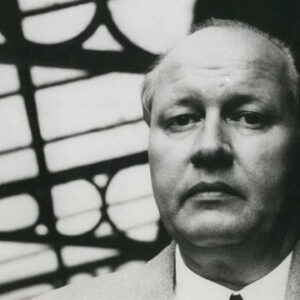American poet Theodore Huebner Roethke is regarded as one of the most prominent poets of his generation. He is renowned for the intricate body of work he produced over his lifetime, which was rich in human emotions, reflection, and natural imagery. The contemplative quality of his works such as ‘The Waking,’ ‘Words for the Wind,’ and ‘The Far Field’ has earned him important accolades such as the Pulitzer Prize for poetry, the National Book Award for Poetry, etc. The majority of Roethke’s life was spent teaching at various educational institutions, writing for numerous periodicals, and compiling his own works. He taught at institutions such as Lafayette College, Michigan State University, Pennsylvania State University, etc., and contributed to magazines such as Poetry, Saturday Review, and the New Republic. Throughout his adult life, Roethke battled manic depression and alcoholism, likely as a result of his childhood experiences of losing his father to cancer and his uncle to suicide. The tragedy made the young Roethke a recluse who sought refuge in nature, which ultimately impacted his personality and inventiveness throughout his life.
Youth and Early Life
On May 25, 1908, in Michigan, Theodore Roethke was born to Otto Roethke and Helen Huebner. His father was a greenhouse owner and market gardener. Growing up on the Saginaw River, Roethke spent most of his time in the greenhouse.
He attended high school at Arthur Hill. In 1923, at the age of 14, the suicide of his close uncle and the loss of his father from cancer devastated his life. This event is claimed to have impacted Roethke’s mind and inventiveness throughout his lifetime.
Roethke enrolled at the University of Michigan in 1925. His family encouraged him to pursue a legal career, but he dropped out of law school after only one semester. Later, he went to Harvard University to study poetry with a poet.
Theodore Roethke’s Career
Due to the severe economic and social effects of the Great Depression, Roethke was forced to leave Harvard in 1931 to teach at Lafayette College until 1935. Here, he began writing his first book, titled “Open House.”
He began teaching at Michigan State College towards the end of 1935, but was unable to withstand the pressure and suffered a mental collapse. It allowed him to expand his writing ability.
Roethke began teaching at Pennsylvania State University in 1936, where he earned his reputation as a poet. He taught at this university for seven years while concurrently publishing in prestigious periodicals such as Poetry, Saturday Review, etc.
His debut book, Open House, was released in 1941 and received acclaim from journals such as The New Yorker, The Kenyon Review, The Atlantic, etc. His writing was influenced by authors such as Emily Dickinson, Louise Bogan, and Stanley Kunitz, among others.
In 1942, Harvard invited Roethke to present their prestigious Morris Gray lectures. In 1943, began teaching at Bennington College, where he also began writing “The Lost Son and Other Poems.”
In the 1950s, he published works such as “Praise to the End!” (1951) and “The Waking” (1953), among others. Roethke examined sexuality and eroticism in the majority of these works. The Guggenheim Fellowship and the Poetry Magazine Levinson Prize were granted to him.
Roethke traveled to Europe in 1957 and began gathering forty-three poems for his new book, Words For The Winds. He earned numerous accolades for it, including the Bollingen Prize and the National Book Award, among others.
In the 1960s, he released works such as ‘I Am! Says the Lamb’ and ‘Party at the Zoo’
The Modern Masters Book for Children with “The Far Field (1964)” The final volume was published posthumously.
Theodore’s Major Opera
‘Words For The Winds,’ a 1958 collection of 43 poems, is regarded as Roethke’s most notable work, and he received numerous major honors for it.
Awards & Achievements
Numerous literary honors were given to Roethke for his poems. In the 1950s, he received the majority of these honors: the Pulitzer Prize for ‘The Waking,’ the National Book Award for ‘Words For The Wind’ and ‘The Far Field,’ and a Guggenheim Fellowship.
Other prizes include the Levinson Prize from Poetry magazine, large funds from the Ford Foundation and the National Institute of Arts and Letters, the Bollingen Prize, the Edna St. Vincent Millay Prize, the Longview Foundation Award, and the Pacific Northwest Writer’s Award.
Personal History and Legacy
Roethke was married to Beatrice O’Connell in 1953. While teaching at Bennington, he became acquainted with her for the first time. After their marriage, he honeymooned with her at W.H. Auden’s villa in Italy for a couple of years.
On August 1, 1963, he died of a heart attack in the swimming pool of his friend S. Rasnics on Bainbridge Island, Washington. During this moment, he was 55 years old.
Estimated Net Worth
Theodore Roethke’s estimated net worth is $5 million, with primary income sources being teachers, authors, and poets. We lack sufficient evidence regarding Theodore Roethke’s automobiles and way of living.
Trivia
When Roethke wed O’Connell, he did not disclose his lifetime struggle with manic depression. He was a heavy drinker and suffered from severe spells of depression on occasion.
Sylvia Plath was strongly affected by his works.


